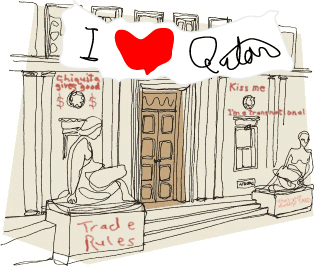
Site map > Download site as .rtf document
The Teargas Ministerial > Trade economics
NAFTA and after

Site map > Download site as .rtf document |

What's wrong with the WTO?
|
When is trade "free"?A central principle of the 1947 General Agreement on Tariffs and Trade (now enforced by the WTO) was non-discrimination: products imported from one country should be treated the same as those imported from all other countries and those produced within the importing country. This principle is expressed in two technical terms:
WTO provisions and rulings, however, go far beyond these concepts in turning trade into an end in itself rather than a means to improve people's lives. Under them, even national standards that respect these well-established benchmarks can still be declared illegal restrictions on trade. And the WTO's version of "free trade" has distinct limits. Countries and corporations of means can manipulate negotiations and dispute settlements to their advantage. When it comes to intellectual property, for example, the WTO's TRIPS Agreement enforces restrictions on trade—copyrights and patents—in the name of encouraging innovation. This benefits almost exclusively wealthy nations and transnational enterprises, while harming small farmers and indigent AIDS victims. Yet the WTO outlaws other exceptions to free trade that might benefit poor people and countries. For many sectors in many countries, lowering barriers to international trade may be a viable policy. But no developed country has industrialized without protection and government support of critical industries. And many developing countries who have thrown their economies open to international markets have sunk deeper into poverty and debt. Developing and industrialized countries alike should be able to weigh the pros and cons of trade liberalization for their particular economy against other social values and goals. The WTO is harmful not because it promotes free trade, but because it forecloses with closed tribunals and draconian penalties the possibility of any economic strategy other than corporate-managed trade. It attempts to impose an anti-democratic monoculture on an exuberantly heterogeneous world. |
The WTO's Bill of WrongsYou cannot restrict trade in a good based on how it is produced."Production and processing methods" can't be considered in trade rules, even if they damage people or the environment. You must use the 'least trade-restrictive' method—not the most effective one—to protect people and the environment.The WTO enshrines commerce as a higher value than other more fundamental human values. Environmental or human-rights standards that are more effective at protecting victims of pollution or dictatorships are trumped by weaker standards that marginally increase trade. You must first prove a substance dangerous before restricting its use.The WTO assumes untested chemicals and technologies are safe until proven otherwise. This stands the Precautionary Principle—better safe than sorry—on its head, and can force nations to lower their public health, safety and environmental standards. You must lower national standards if they are higher than international standards.The WTO sets ceilings rather than floors for national consumer, environmental, and worker protections. When international standards are lower than your own, you must harmonize your standard downwards. You must treat life forms and life-saving drugs as commodities.The WTO honors monopolies in intellectual property over human needs for medicine and food, threatening public health, small farmers, indigenous knowledge and biodiversity in developing countries. You must deregulate and privatize essential public services.The WTO pressures member nations to open their basic public services and resources to the market, to to detriment of their citizens and the benefit of transnational corporations. You cannot use trade policy to encourage development in poor countries.The WTO restricts less-developed countries' use of trade as a tool to foster balanced development. It also attacks special trade arrangements that make up for past injustices. You must subordinate human rights to free trade.The WTO weakens the power of citizens to champion human and labor rights through the policies of their governments. The WTO v. democracyWTO processes favor big business and rich countries.The WTO's undemocratic decision-making mechanisms are weighted in favor of the industrialized nations and against developing countries. Transnational business groups exert heavy influence on policies and negotiations, while citizen groups are marginalized and excluded. The WTO resolves disputes unfairly behind closed doors.The WTO dispute resolution process is secretive, biased and exclusive, concentrating power in the hands of international-trade insiders. It does not include procedural safeguards or due process protections, yet it exerts tremendous coercive power over member countries. Visions of changeAlternative paths to fairer trade rulesKey proposals on how to impose sustainable societal values on international commerce |